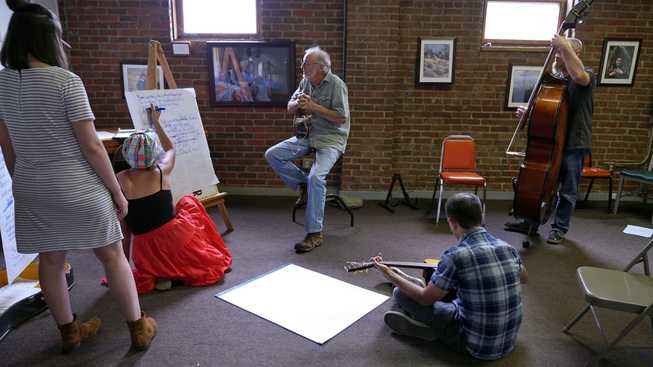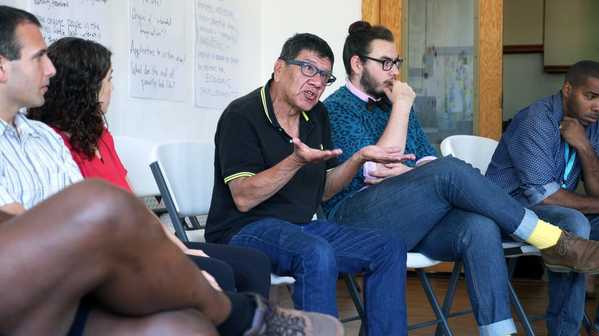PERFORMING OUR FUTURE:
O V E R V I E W
 Participants in the 2016 Institute's songwriting team. Credit: Holly Zahn/IA
Participants in the 2016 Institute's songwriting team. Credit: Holly Zahn/IA
Across the U.S., there’s a growing recognition that art and culture can drive community and economic development. But it’s rare when those artistic efforts include rural communities and their colleges, or focus on bringing together all parts of a community, including its poor and working class residents, for development that is equitable.
A new initiative, Performing Our Future, is creating a model for how to do just that.
Over a two-year period (and with funding from the Doris Duke Charitable Foundation, ArtPlace America, the National Endowment for the Arts, the Hearst Foundations, and the Andrew W. Mellon Foundation), communities in different geographic locations will demonstrate how artistic expression leads to community-wide empowerment and how the assets of local culture can develop economic sustainability.
A union of economists, artists, and scholars is behind the initiative’s methodology: grassroots arts and media institution Appalshop and its Roadside Theater; the economists and students at Lafayette College’s Economic Empowerment and Global Learning Project in Easton, Pa.; and the national consortium of 100+ colleges advancing public scholarship, Imagining America: Artists and Scholars in Public Life. Key elements in the methodology include creating public performances based on local stories and mapping community assets to identify opportunities for value and wealth creation through market exchange.
“Appalshop and Roadside Theater have long been national leaders in making art for communities, with communities, and by communities, with transformative results,” says Ben Cameron, Director of Arts at Doris Duke Charitable Foundation, which recently announced a $225,000 grant to support Performing Our Future. “We are thrilled to support this project, which promises to increase both appreciation for their work and the impact of their work even further.”
To enrich learning, ensure national impact, and develop and disseminate findings, the local projects will interface with each other and with the national research team of economists, artists, scholars, and students.
A new initiative, Performing Our Future, is creating a model for how to do just that.
Over a two-year period (and with funding from the Doris Duke Charitable Foundation, ArtPlace America, the National Endowment for the Arts, the Hearst Foundations, and the Andrew W. Mellon Foundation), communities in different geographic locations will demonstrate how artistic expression leads to community-wide empowerment and how the assets of local culture can develop economic sustainability.
A union of economists, artists, and scholars is behind the initiative’s methodology: grassroots arts and media institution Appalshop and its Roadside Theater; the economists and students at Lafayette College’s Economic Empowerment and Global Learning Project in Easton, Pa.; and the national consortium of 100+ colleges advancing public scholarship, Imagining America: Artists and Scholars in Public Life. Key elements in the methodology include creating public performances based on local stories and mapping community assets to identify opportunities for value and wealth creation through market exchange.
“Appalshop and Roadside Theater have long been national leaders in making art for communities, with communities, and by communities, with transformative results,” says Ben Cameron, Director of Arts at Doris Duke Charitable Foundation, which recently announced a $225,000 grant to support Performing Our Future. “We are thrilled to support this project, which promises to increase both appreciation for their work and the impact of their work even further.”
To enrich learning, ensure national impact, and develop and disseminate findings, the local projects will interface with each other and with the national research team of economists, artists, scholars, and students.
H O W D O I U S E t h i s t o o l k i t ?
 Activist-teacher Roberto Bedoya at the Institute. Credit: Holly Zahn/IA
Activist-teacher Roberto Bedoya at the Institute. Credit: Holly Zahn/IA
In its introduction to Participatory Playbook: an Exhibition at LOOK3, the Magnum Foundation cautioned: "Despite the richness of this practice, many projects lack revealing documentation of the way these processes unfold, thus rendering what is often the heart of the work – webs of partnerships, meetings, community-based events, dialogues, working groups, communications and partnerships – inaccessible to secondary audiences. These unhelpful forms of documentation become roadblocks for those viewers, educators, and practitioners looking to these projects as models of engagement."
This digital toolkit, designed to make transparent the "heart" of Performing Our Future's collaborative work, is intended for any person, team, or organization looking to explore the questions:
How can arts and culture promote individual voice and collective agency, unbounding my community’s imagination and ambition in order to create the conditions for economic development?
How can my community organize itself to build an economy that’s broad-based and sustainable?
Inside, you'll find tools including:
The best way to use the toolkit is to explore and play! You might begin by reading about Appalshop's Letcher County Culture Hub, studying our glossary of economic development terms, or listening to original bluegrass music written and performed by Performing Our Future participants. No matter where you start, you'll find development strategies rooted in one simple idea: building community centers of power that intentionally breach lines of race, class, gender, age, disability, and more.
This digital toolkit, designed to make transparent the "heart" of Performing Our Future's collaborative work, is intended for any person, team, or organization looking to explore the questions:
How can arts and culture promote individual voice and collective agency, unbounding my community’s imagination and ambition in order to create the conditions for economic development?
How can my community organize itself to build an economy that’s broad-based and sustainable?
Inside, you'll find tools including:
- Multimedia documentation of all Performing Our Future activities and programs to date
- Downloadable reference guides to Appalshop's community cultural development (CCD) methodologies
- Useful links to press, partner organizations, and other supplementary materials for context and further investigation
- Periodic news about POF activities and participants in communities across the U.S.
- Interviews, transcripts, and more process-focused features available exclusively in the Digital Toolkit
The best way to use the toolkit is to explore and play! You might begin by reading about Appalshop's Letcher County Culture Hub, studying our glossary of economic development terms, or listening to original bluegrass music written and performed by Performing Our Future participants. No matter where you start, you'll find development strategies rooted in one simple idea: building community centers of power that intentionally breach lines of race, class, gender, age, disability, and more.
H O W C A N I G E T I N V O L V E D W I T H P O F ?
Send us a private message....
Or post a comment to this site!